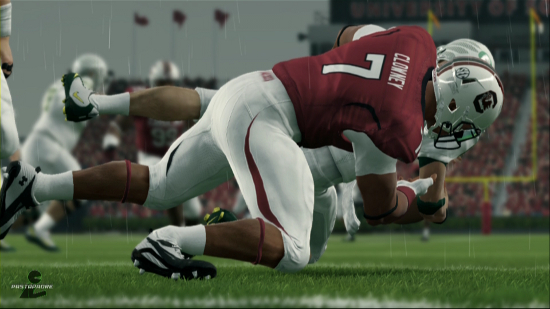EA and CLC Settle Player Likeness Lawsuit

Soon after the news broke that EA was ending their college football series a release was made regarding the settlement of the player likeness lawsuit that was at the center of the entire situation that threatened the future of college video games and still could take down the NCAA as it remains as the lone defendant. Games were just a small part of the claim in which players believe they are entitled to a share of broadcasting and merchandising revenues.
From the press release: “Today’s settlement is a game-changer because, for the first time, student-athletes suiting up to play this weekend are going to be paid for the use of their likenesses…Based on this settlement and other recent court rulings, EA Sports has agreed to change the way it develops future games featuring NCAA athletes in order to protect the rights to their likenesses.”
Of course “changing the way it develops future games” is what will make it unfeasible for EA to continue the series or any other company to consider it in the future. The terms likely identified rosters and making them completely random while stripping out the ability for consumers to edit names and share them.
With those restrictions in mind a college video game would not be viable fiscal investment already. On top of it losing the NCAA and conference branding along with many individual schools is the nail in the coffin. There would be no alternatives either as a “Teambuilder” game would never work – not only would it not sell but it would be a haven for copyright infringement that the company would need to police 24/7 and open themselves to further litigation.
As it stands now there is no hope of any college video games being produced in the foreseeable future. The settlement brings to a close a lot of uncertainty that would have potentially dragged on for over five more years – unfortunately the conclusion is one that leaves college football fans without any video game representations of their favorite sports.
Earlier/Summary Below
The player likeness lawsuit against the NCAA, CLC, and Electronic Arts is the culmination of two high profile filings that were combined as led by Sam Keller and Ed O’Bannon (and O’Bannon now heads it up). It alleges improper use of player likeness through various forms of merchandise and media including video games in which the parties in question conspired to avoid paying players for their rights. Some interesting details and claims regarding the case at hand were revealed when EA was reentered as a defendant after initially being dismissed.
EA originally won a previous case regarding player likeness with the courts ruling video games are artistic works rather than commercial speech and therefore protected by the First Amendment. The Supreme Court in 2011 established forms of media, producing expressive works of art, are not subject to judgments based on incorporating someone’s name or likeness. That dismissed case however, involving Ryan Hart, has resurfaced after an appeals court reversed a decision based on that argument.
Recent uncovered emails have shown that NCAA representatives were well aware that players in games were based off real-life players. At one point the NCAA and EA had nearly reached an agreement to have actual player names included in the products. The EA Locker / Roster Share feature was a fallback option. With momentum clearly on the plantiffs’ side NCAA reps have begun to publicly express concern over the future of collegiate sports. A former EA Sports producer admitted players in NCAA games were based off real athletes.
The discovery of Tim Tebow’s name being in NCAA Football 10 could throw another wrench into EA’s series of arguments. Depositions from former Alabama wide receiver Tyrone Prothro and UConn basketball guard Tate George support the defendant’s reasoning for denying class action certification. The class action hearing resulted in the judge heavily questioning the legitimacy of a potential class and insisting a current athlete be involved. The judge required current athletes be added as plaintiffs for that party to have representation if the case is certified as class action. Six current college football players were added as plaintiffs in mid-July.
EA is now arguing to be dismissed as a defendant in the suit. A major defense for the company however was recently struck down by an appeals court.
This consolidated case in California if certified as class action would go to trial – barring a settlement – and ultimately be the determining factor of how the NCAA proceeds in the future handling broadcasting rights, merchandising, and video games. Should a negative result come down, which one analyst has pegged as being a potential loss of $1 billion for EA, it would likely not just end the NCAA Football series but also with it any realistic possibility of college sports games being made in the future. The trial now is slated to begin June 9, 2014. Appeals following a decision could extend the fight through 2020.
[RESOLUTION] EA and the CLC have settled the lawsuit. EA Sports will no longer produce a college football game.
